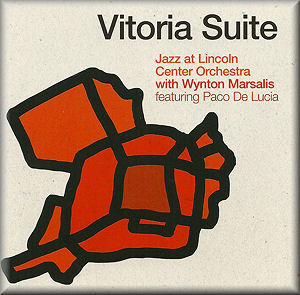CD1
1. Big 12 (Gran Doce)
2. Smooth in the Night (Suave En La Noche)
3. Jason and Jasone (Jason y Jasone)
4. Buleria el Portalon
5. Blood Cry (La Llamada De La Sangre)
6. Inaki's Decision (La Decision De Inaki)
CD2
7. The Tree of Freedom (El Arboi De La Libertad - Askatasunaren Zuhaitza)
8. Deep Blue from the Foam (Profundo Lamento Desde La Espuma)
9. This Land and the Ocean (Esta Tierra y El Mar)
10. Dato Street Fiesta (Fiesta En La Calle Dato)
11. Basque Song (Cancion Vasca; Euskal Abestia)
12. Mendizorrotza Swing
Wynton Marslis - Trumpet, music director
Sean Jones, Ryan Kisor, Marcus Printup - Trumpets
Vincent Gardner, Chris Crenshaw, Elliot Mason - Trombones Sherman Irby - Alto sax
Ted Nash - Alto sax, soprano sax, clarinet
Walter Blanding Jr - tenor sax, soprano sax
Victor Goines: - Tenor sax, soprano sax, Bb clarinet, bass clarinet
Joe Temperley - Baritone sax, soprano sax, bass clarinet
Dan Nimmer - Piano
Carlos Henriquez - Bass
Ali Jackson - Drums
Paco de Lucia - Guitar
Chano Dominguez - Piano
Israel Suarez "El Pirana" - Percussion
Tomas Moreno "Tomasito" - Jaleo, clapping, dance
Blas Cordoba "El Kejio" - Jaleo, clapping
Wynton Marsalis seems to have become a target for many jazz fans who think of themselves as "progressive", because Wynton has publicly championed traditional values in jazz. But this is by no means to say that Marsalis is stuck in the past. This new album proves that he is as forward-looking as anybody. The sleeve-notes remind us that, when Wynton arrived to play at the Vitoria-Gasteiz Jazz Festival in the Basque region of northern Spain in 1987, the organiser reminded him that it was the 20th anniversary of John Coltrane's death. That night, without any rehearsal, Wynton's quartet played a concert devoted primarily to Coltrane's compositions.
The Festival organiser, Inaki Anua, became friends with Marsalis and, on one of his frequent visits to the Festival, Wynton was urged by Inaki to write a short blues to celebrate the 25th anniversary of the Festival. Wynton's reply was "I don't know how to write short pieces, I'll compose a suite". The Vitoria Suite is the result. Its 12 movements reflect the measures of the twelve-bar blues. The suite also reflects Spanish music, including flamenco and Basque styles. These influences are reinforced by the presence of such guests as guitarist Paco de Lucia and pianist Chano Dominguez.
Marsalis's arrangements are progressive in that they make the big band sound unlike any other big band - except perhaps the Duke Ellington Orchestra, the most progressive big band ever. Like Ellington, Marsalis avoids the mass section work of conventional big bands but provides us with an ever-changing panoply of sounds and voicings. The suite shows that, while Wynton respects the past, he can be extremely forward-looking.
The very first track begins with the highly Spanish sound of hands clapping rhythmically, which becomes a leitmotiv that recurs throughout the suite. In the third movement, Marsalis uses the clarinet as the lead instrument, which is somewhat reminiscent of how Ellington used Jimmy Hamilton. Like Ellington, too, Wynton plays to the strengths of his musicians, using the considerable talents of such musicians as Ryan Kisor, Sean Jones, Victor Goines and Joe Temperley. This is not to forget the powerful soloing of Marsalis himself, which adds extra muscularity to several tracks. Just sample his committed feature on Blood Cry.
Most tracks are quite long and exceedingly complex, defying step-by-step analysis. In fact, this is the sort of album which demands several hearings, since Wynton's compositions are so varied and eventful. However, some tunes - like Dato Street Fiesta - are immediately catchy and deserve to be taken up by other bands.
Buleria el Portalon is very Spanish, with hands clapping, feet stamping, a mariachi feel from the trumpets, and flamenco-style solos from Dan Nimmer and Paco de Lucia. Deep Blue (From the Foam) emphasises the blues, with economical scoring, leaving plenty of space for Paco de Lucia's acoustic guitar (which somehow manages to draw parallels between flamenco and the blues) and an unaccompanied duet for two saxes. Basque Song is a flowing waltz, with romantic playing from various saxophones, including the splendidly gruff baritone sax of Joe Temperley. The Tree of Freedom opens with a long, Spanish-tinged piano solo by Dan Rimmer which is like the cadenza from a concerto. In fact most tracks are like mini-symphonies, witn several different contrasting sections. Mendizorrotza Swing is a bustling swinger which exhibits the instrumental brilliance of the whole ensemble.
Some well-known critics have already damned this double CD with faint praise. What a pity that they can't use their ears instead of their preconceptions! This is a superb album.
Tony Augarde
